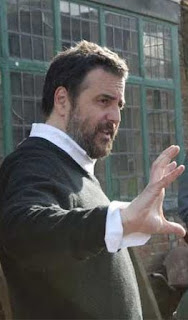“You poor creatures.” Is this quiet exclamation not a fitting epitaph for the human race? In NEVER LET ME GO, the maybe-masterpiece that director Mark Romanek (below) and screenwriter Alex Garland have made from the novel by Kazuo Ishiguro, we hear this statement addressed, with profound sadness, to two of the film’s three protagonists. Their antagonist is society itself, of course. Historically, most societies have found a way to make their power system – Capitalist, Communist or Fundamentalist – serve those who hold that power and who thus make certain that the “haves” are well-served by the “have-nots,” usually by positioning a portion of their people into the status of “other.”
One of (maybe the most important) uses of science-fiction -- of which this novel and its filmed adaptation are examples (they also fit into the categories of "alternate universe" scenarios and dystopian fiction, though is any society not dystopian?) -- is to explain how our own world works (and might work better or worse) by showing us imagined, futuristic worlds. Never Let Me Go achieves all this and more without ever raising its voice or sporting a special effect. One of its charac-ters raises his voice -- once, early on, as a child, and then later as an adult. This second time provides a despairing heart-rending moment, the likes of which has seldom been seen (or heard) in cinema history. It's that kind of movie. And yet it never insists.
The film follows the lives of two girls (Kathy and Ruth) and a boy (Tommy) from early adolescence to adulthood, giving away the secrets of who these people are only gradually and glancingly. (That's Ella Purnell, above, as young Ruth, and Isobel Meikle-Small, below left, as young Kathy with Charlie Rowe, who plays young Tommy.)
Just as gradually and glancingly as the facts of the situation come to light, so, too, do the filmmakers give us entry into the the minds and emotions of the three, and this, I think, is the key to why the film succeeds so well. By the time the movie draws to its ineffably fraught conclusion, we have come so far in understanding and empathy that there, at last, lies before us life in all its devastating complexity, pain, sadness and even -- against all sense, considering the awful situation at hand -- joy and love, tinged as both are with the knowledge of how soon we must lose them.
The actors who assume the young-adult and then the fully-adult versions of the children are Cary Mulligan (above, left, from An Education), Keira Knightley, (center, from those "Pirates" movies and The Duchess) and Andrew Garfield (Boy A and the Red Riding Trilogy). They are splendid and unforgettable. Ms Mulligan, in particular, assuming the pivotal role, is a revelation and then some. Her final speech is as moving and profound as anything in the canon. In the supporting cast are Charlotte Rampling (as the headmistress of the school at which our threesome is taught, Natalie Richard as its "art" connoisseur and Sally Hawkins, below, as the teacher who decides to explain their future to the children.
The movie itself is profound. Along the way, you'll be put in mind of everything from countless Holocaust documentaries and narratives to the long, ongoing journey for black, gay and women's civil rights. You may think of the surprisingly fine Torchwood: Children of Earth or M. Night's silly The Village and Michael Bay's sillier The Island, of Logan's Run, Soylent Green and other sci-fi films that address the bizarre ways in which society "solves its problems." And of Blade Runner, of course, and what it means to be human.
This film outdoes them all in its own quiet way. No explosions nor chases. Hardly a special effect to be seen. (The little lighted bracelets that the kids use to "check in" is as much "sci-fi" effect as we see.) The odd, sort-of mauve, hard-to-describe screen color featured in the credits and that also connects the scenes may remind you of one used in the lovely, little-seen Canadian film Snow Cake. The choice of a color this unusual suggests, I think, what lies in store.
Romanek, Garland and Ishiguro manage to place us, as completely as I have experienced in a movie, into the role of the "other." Yet interestingly enough, most everyone we see here is "white." (Britain seems to have solved her immigration problem, though I shudder to think how.) I can't imagine any intelligent and empathetic person -- whether gay, black, woman, Jew, Irishman, Serb, Croat, Italian and all the rest of those "minorities" -- leaving the theater without the echo of "You poor creatures" resounding in their mind and heart and realizing, I hope, that it is in truth "We poor creatures."
Never Let Me Go, from Fox Searchlight, opens this Wednesday, September 15. In New York City, it will play at the AMC Loew's Lincoln Square 13 and at Landmark's Sunshine Cinema.













No comments:
Post a Comment